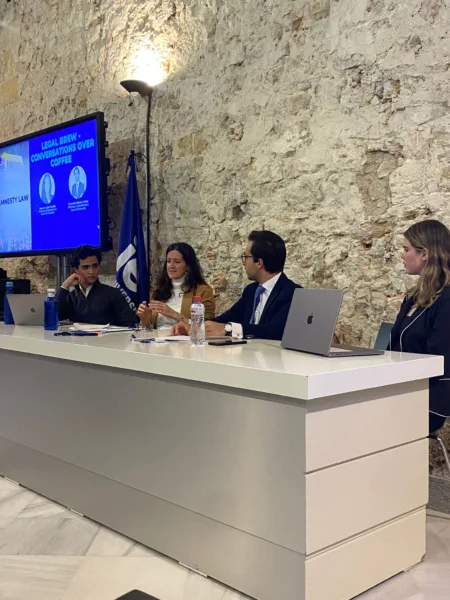This article is written in conjunction with the IE Law Society.
By Klaudia Kupidura
Is the newly proposed amnesty law compliant with the Spanish constitution? Does it challenge the highly respected rule of law and the principle of the separation of powers? These were the questions posed by panellists during the “Legal Brew” event organised by the Law Society at Segovia Campus. On the 30th of January, IE students had the opportunity to participate in an inspiring debate between Professor Sonsoles Arias Guedón and Professor Fernando Martín Arribas on the proposed introduction of Amnesty Law in Spain.
Political and cultural context – the case of Catalonia
To understand the implications of the current amnesty proposal, it is crucial to look into the political and cultural context, more precisely, the relationship between the Spanish central government and the autonomous community of Catalonia. The Spanish system of governance is characterised as federal, where autonomous communities exercise administrative and political decisions-making powers. However, their powers limited in the organic law, Statute of Autonomy and the Spanish Constitution (1978).
In 2006, the government of Catalonia challenged the status of autonomy by demanding the right to self-government. In 2014, the ‘Catalan self-determination referendum’ was initiated where most of the voters approved the establishment of an independent state. In 2017, the referendum was replicated producing a similar result. Both referenda were declared unconstitutional by the Spanish Constitutional Court in judgement 42/2014, of 25 March 2014 and 114/2017, 17 October 2017.

Amnesty law explained
To give an amnesty means to grant a pardon to those who have committed an offence.[1] It further implies that the alleged criminals are released from prison and their arrest warrants are lifted. The currently debated amnesty law would cover the period from 1 January 2012 to 13 November 2023, therefore, the two referenda in 2014 and 2017. The bill would grant amnesty for those who faced criminal charges for their role in Catalan independence process, specifically the politicians and civil servants involved in the referendum.
The principle of separation of powers
‘Our constitution tried to adopt the diversity of our country’ argued Professor Guedón. With her expertise in the vertical separation of powers, she explained the possible imbalance of powers which is created by the introduction of the amnesty law. ‘What happens is that the executive is telling the parliament what to do’, she said, pointing out that all courts will then be obliged to implement the law. Judges will not be able to evaluate the occurrence of alleged crimes, among them: usurpation of public functions, misconduct, embezzlement, acts of disobedience, or administrative fraud.
Professor Fernando argued that the amnesty law is ‘stopping the effects of the criminal code’ resulting in the breach of the rule of law. The creation of the imbalance between the branches of government is seen by Professor Guedón as a very concerning and perhaps even illegal step.
Is it constitutional?
Professor Fernando Martín Arribas argued that there are three elements that should be taken into consideration while analysing the constitutionality of the proposed law: source, content, and intention. The Spanish constitution doesn’t explicitly prohibit the introduction of amnesty, nor does it permit it. ‘Amnesty is too wide and too open in terms of defining criminal conduct’, claimed Professor Fernando referring to the principle of responsibility. Can the amnesty be so extensive that it applies to any person who commits an action prohibited by law?
‘From this moment on there are two positions; those who support it and those who don’t’ argued Professor Sonsoles. The debate is strongly influenced by an affiliation to political parties; the followers of the separatist Junts will be supportive of the claim that the amnesty should be granted to alleged criminals, whereas those on the political right will see this as another unfavourable action of President Sanchez. ‘This amnesty will set up the precedent for regional parties’ said Professor Sonsoles referring to the pro-independent sentiments in Basque country. ‘It is not the way to solve the Catalan problem’, she affirmed.
This is a legal grey area with neither professor willing to outright declare amnesty unconstitutional. However, the uncertain nature of the entire matter cast a clearly negative tone around the amnesty proposal.
This article was written on the 3rd of February and the information is current until then. As amnesty bill is under debate in the Spanish Parliament, the rapidly changing political situation may have resulted in alterations post February 3rd which are not covered in this article.




